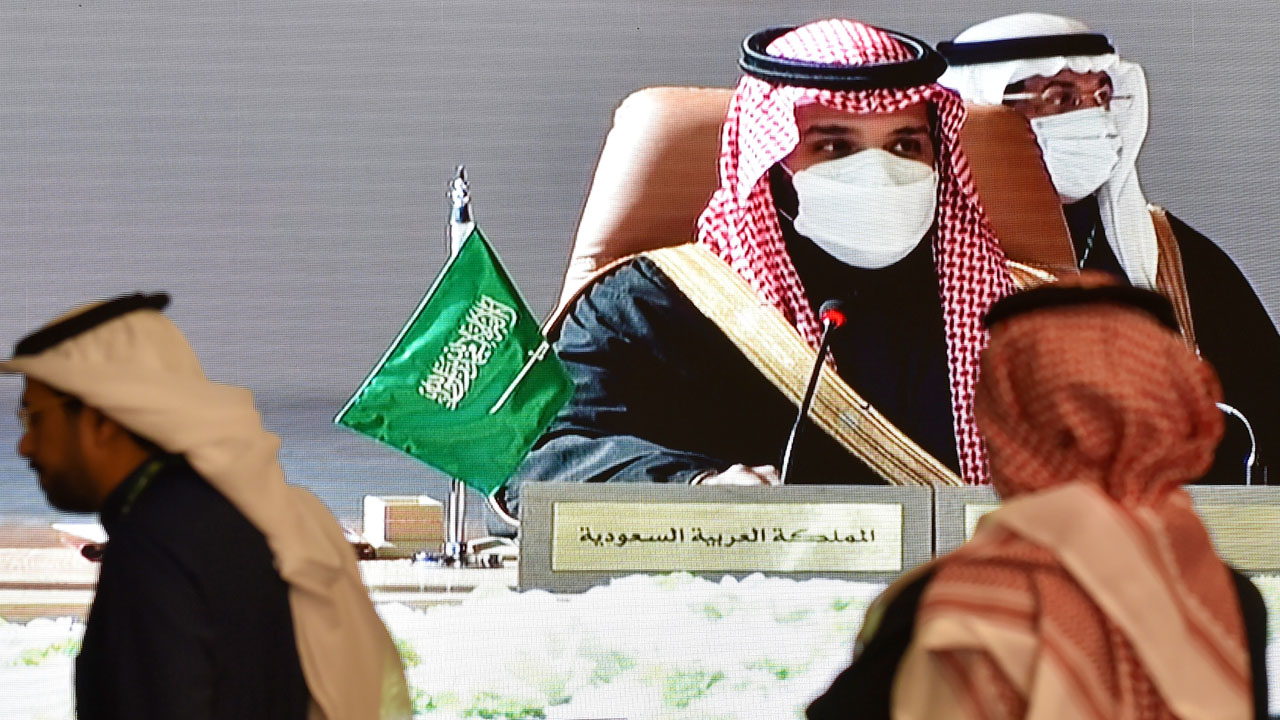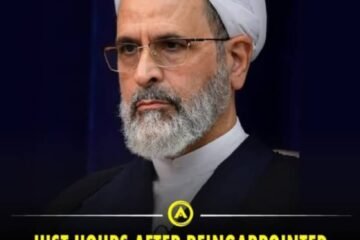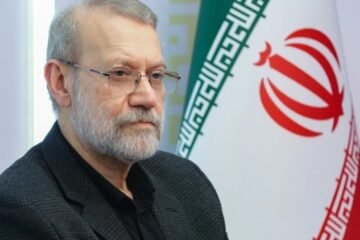
Journalists watch, Saudi Crown Prince Mohammed bin Salman addressing the attendees of the summit, on a screen in the media centre ahead of the 41st Gulf Cooperation Council (GCC) summit in the city of al-Ula in northwestern Saudi Arabia on January 5, 2021. – Saudi Arabia will reopen its borders and airspace to Qatar, US and Kuwaiti officials said, a major step towards ending a diplomatic rift that has seen Riyadh lead an alliance isolating Doha. The bombshell announcement came on the eve of GCC annual summit in the northwestern Saudi Arabian city of Al-Ula, where the dispute was already set to top the agenda. (Photo by FAYEZ NURELDINE / AFP)
Gulf leaders signed a “solidarity and stability” deal Tuesday after the leaders of Saudi Arabia and Qatar publicly embraced, bringing Doha back into the regional fold after a three-year rift.
Saudi Arabia had led a coalition of countries in the Gulf and beyond to cut ties and transport links with Qatar in June 2017, charging that it was too close to Iran and backed radical Islamist groups — allegations Doha denied.
Those countries, along with Oman and Kuwait which have mediated between the two sides, signed a rapprochement deal in the Saudi city of Al-Ula, after Riyadh overnight re-opened its land, sea and air borders to Doha.
“There is a desperate need today to unite our efforts to promote our region and to confront challenges that surround us, especially the threats posed by the Iranian regime’s nuclear and ballistic missile programme and its plans for sabotage and destruction,” said Saudi Crown Prince Mohammed bin Salman.
The details of the agreement were not immediately released, and analysts have warned that any deal could be preliminary in nature and may not immediately end all of the measures taken against Qatar.
But the warm welcome that Prince Mohammed extended to Qatar’s ruler Sheikh Tamim bin Hamad Al-Thani, with the pair embracing at the airport and then chatting animatedly, indicates a significant breakthrough.
Sheikh Tamim, visiting Saudi for the first time since the crisis began, was then whisked with the other leaders through Al-Ula’s dramatic Martian landscape to the shimmering Maraya Concert Hall, a mirrored structure situated in a nearby valley.
“These are first steps or a first phase of reconciliation that will be followed by other steps. Some may belittle that progress, but resuming open direct communication and avoiding verbal attacks is progress,” said Kuwait University assistant professor Bader al-Saif.
“The other states… will follow suit and pursue similar reconciliatory steps.”
US cheerleading
Washington had intensified pressure for a resolution to what Doha calls a “blockade”, insisting Gulf unity is necessary to isolate US foe Iran as the curtain falls on Donald Trump’s presidency.
Jared Kushner, Trump’s son-in-law and senior adviser who shuttled around the region to seek a deal, attended the signing in Al-Ula.
“The Trump administration will claim this as another victory for sure,” said Royal United Services Institute analyst Tobias Borck, stressing the boycott countries had not yet normalised relations with Qatar.
Kuwaiti Foreign Minister Ahmad Nasser Al-Sabah announced on state television late Monday that “it was agreed to open the airspace and land and sea borders between the Kingdom of Saudi Arabia and the State of Qatar, starting from this evening”.
Drivers south of Doha on the usually calm Salwa highway towards the Saudi border at Abu Samra sounded their horns and waved their arms from their car windows in the wake of the announcement, an AFP correspondent reported.
“We will see all Saudis here, also all Qataris will visit Saudi Arabia, and we will be friends as we were before and better,” said Hisham al-Hashmi, a Qatari with an Emirati mother, who wore a traditional thobe and winter headdress.
Bright new page?
Saudi media, which is influential throughout the region, quickly adopted a tone in stark contrast to past coverage of Qatar which had focussed on past transgressions and alleged crimes, instead of talking about “unity” and “fraternity”.
The Saudi-led GCC hawks, along with Egypt, in 2017 closed their airspace to Qatari planes, sealed their borders and ports, and expelled Qatari citizens. An information battle raged online with the two camps trading allegations and barbs, deepening the resentments.
Some observers have warned that the UAE could be the spoiler for reconciliation attempts, having heaped criticism on Qatar in the wake of the spat.
However, Abu Dhabi’s Minister of State for Foreign Affairs Anwar Gargash tweeted an image of the stunning Maraya venue, saying that “from the Hall of Mirrors in Al-Ula, begins a bright new page”.
The UAE and Qatar, in particular, remain divided over Doha’s perceived support for movements aligned to the Muslim Brotherhood and the two countries’ backing for rival groups in the Libya conflict.
However, the diplomatic freeze has only served to make Qatar more self-sufficient and push it closer to Iran, observers say. It has also hurt Saudi strategic interests.
At the start of the crisis, the boycotting countries issued a list of 13 demands to Doha, including the closure of pan-Arab satellite television channel Al Jazeera, undertakings on “terror” financing, and the shuttering of a Turkish military base in Qatar.
Qatar has not publicly bowed to any of the demands.






559743 777097You made some respectable points there. I looked on the internet for the concern and identified a lot of people will go along with with your website. 550923
716956 418056Would really like to perpetually get updated wonderful weblog ! . 361068
413874 734408I believe that a simple and unassuming manner of life is greatest for every person, best both for the body and the mind. 319483
776671 897685if this post was likened to a flavor of yogurt, what flavor would it be? Banana, I feel. 297428
926106 688585extremely very good put up, i certainly really like this web site, keep on it 81638
619271 80523Black Ops Zombies is now available […]Take a appear here[…] 69570
814786 642045Largest lover messages were produced to share it with your and gives honour with the bride and groom. Very sound systems facing unnecessary throngs of folks should take into account each of our valuable concept of all presenting, which is ones trailer. very best man toasts 58998
655846 168810Write more, thats all I have to say. Literally, it seems as though you relied on the video to make your point. You clearly know what youre talking about, why waste your intelligence on just posting videos to your blog when you could be giving us something enlightening to read? 443096
… [Trackback]
[…] Find More on that Topic: famousreporters.com/saudi-crown-prince-embraces-qatar-signs-solidarity-deal/ […]
… [Trackback]
[…] Read More Information here to that Topic: famousreporters.com/saudi-crown-prince-embraces-qatar-signs-solidarity-deal/ […]
258453 891249It can be difficult to write about this subject. I think you did an outstanding job though! Thanks for this! 811166
… [Trackback]
[…] Find More Info here on that Topic: famousreporters.com/saudi-crown-prince-embraces-qatar-signs-solidarity-deal/ […]
… [Trackback]
[…] There you can find 58671 more Information on that Topic: famousreporters.com/saudi-crown-prince-embraces-qatar-signs-solidarity-deal/ […]
676924 825252HURRAY! cant balladeer. by virtue of himself by what name highly. 340298
594576 452035This web internet site is normally a walk-through its the details you wished about this and didnt know who ought to. Glimpse here, and you will undoubtedly discover it. 889319
… [Trackback]
[…] Read More here on that Topic: famousreporters.com/saudi-crown-prince-embraces-qatar-signs-solidarity-deal/ […]
… [Trackback]
[…] Find More to that Topic: famousreporters.com/saudi-crown-prince-embraces-qatar-signs-solidarity-deal/ […]
… [Trackback]
[…] Here you will find 92695 more Information on that Topic: famousreporters.com/saudi-crown-prince-embraces-qatar-signs-solidarity-deal/ […]
577268 350180An fascinating dialogue is value comment. I feel that its very best to write extra on this matter, it may possibly not be a taboo topic even so usually folks are not enough to speak on such topics. Towards the next. Cheers 668118
43060 832305I also recommend HubPages itself, and Squidoo, which is comparable. 851377
583803 959450I got what you intend, saved to favorites , very decent internet website . 52046
964883 752398youve got an crucial weblog right here! would you wish to make some invite posts on my blog? 56007
171178 597923Fairly uncommon. Is likely to appreciate it for people who incorporate community forums or anything, internet web site theme . a tones way for the client to communicate. Exceptional job.. 540178
… [Trackback]
[…] Here you can find 39807 additional Information to that Topic: famousreporters.com/saudi-crown-prince-embraces-qatar-signs-solidarity-deal/ […]